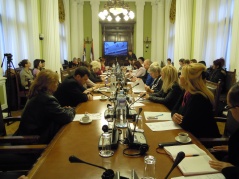National Assembly of the Republic of Serbia / Activities / Activity details

Wednesday, 4 April 2012
Thirty-Seventh Sitting of the Gender Equality Committee
At its 37th sitting held, in the form of a roundtable, to commemorate the Month of Roma Women’s Activism, the Gender Equality Committee deliberated on the topic Roma Women in Serbia – Roma Women’s Activism for Systemic Solutions.
Opening the sitting, Committee Chairperson Gordana Paunovic Milosavljevic said that the sitting was held to commemorate 8 April, International Roma Day. She added that, in the previous period, the Committee had organised a series of seminars on Roma women’s activism aimed at improving the quality of life, protection from violence, literacy and employment of Roma women. The sitting focused on the role of institutions and cooperation with the non-governmental sector in the fight against violence against Roma women (experiences and practice) and systemic solutions and systemic support for the improvement of the position of Roma women (good practice experiences).
State Secretary at the Ministry of Human and Minority Rights, Public Administration and Local Self-Government Slavica Denic said that the number or Roma girls in schools in Serbia has increased which is an improvement compared to the situation in the past. Further progress in the sphere calls for working toward changing the belief shared by Roma men that a woman does not need to work and be educated, stressed the State Secretary.
The representatives of the Roma Women’s Network stressed that the position of Roma women, as a multiply discriminated group, needs to be institutionalised and emphasised the importance of financial support for the implementation of measures, offering free legal services, as well as creating the conditions for the inclusion of Roma women in public and political life. Also, it is very important to keep the public informed on these issues. The Roma Women’s Network launched an initiative to establish local teams for the improvement of the position of Roma Women which have so far had very positive experiences, particularly in Barajevo, Lazarevac, Pirot and Nis where the number of Roma girls enrolled in high-school has risen, thus generally improving their position in society.
Jan Luneneburg from the OSCE Mission to Serbia Democratisation Department stressed that only a society that is fully devoted to anti-discriminatory policies can be considered a democratic society, which is why combating violence against women should be a prominent social topic.
Having exchanged experiences, the Committee adopted recommendations stressing the need to follow the realisation of the national action plan with a special focus on gender-sensitive budgeting, introduce gender indicators into all strategic documents, follow the realisation of plans and assess measures from a gender perspective, introduce systemic measures on the local level by drafting and realise local strategic plans, as well as employ legal mechanisms to make discrimination visible.
On the occasion, the Roma Women’s Network presented the representatives of the local self-governments of Barajevo, Lazarevac, Pirot and Leskovac with plaques for their work on improving the position of Roma women in their local communities.
In addition to the Committee members and MPs, the roundtable-sitting was attended by representatives of the Ministry of Human and Minority Rights, Public Administration and Local Self-Government, Roma Women’s Network activists, representatives of the OSCE Mission to Serbia, Roma Women’s Centre in Belgrade, Equality Protection Commissioner Nevena Petrusic, as well as representatives of the local self-governments of Barajevo, Lazarevac, Leskovac and Pirot.
The action Month of Roma Women’s Activism (8 March – 8 April 2012) is realised by the Roma Women’s Network of Serbia.
The sitting was chaired by Committee Chairperson Gordana Paunovic Milosavljevic.

